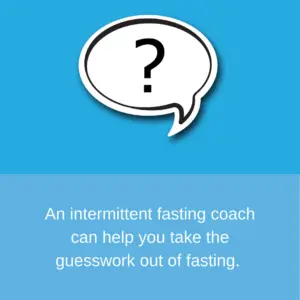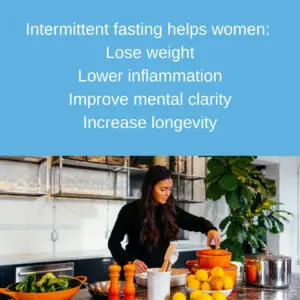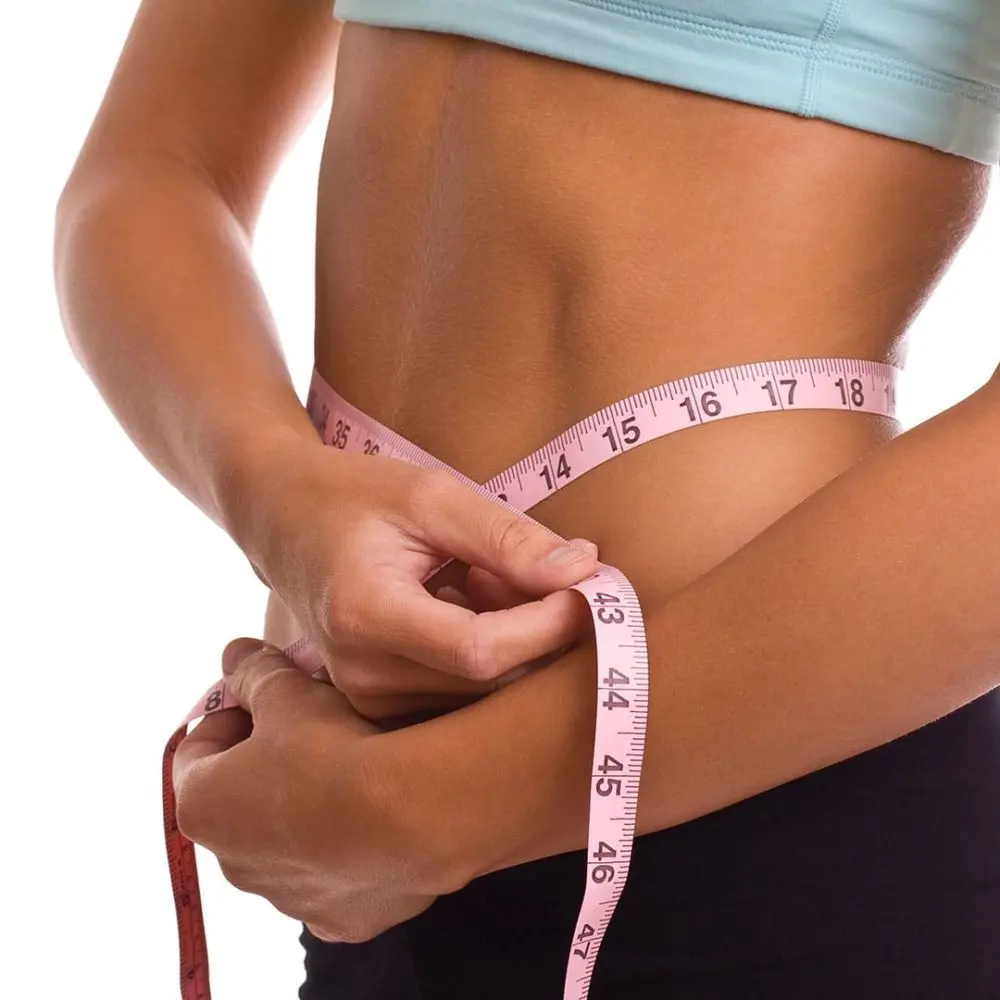Intermittent fasting for women has gained a lot of popularity in recent years. Many women wonder if intermittent fasting is healthy. After all, they see celebrities like Jennifer Aniston, Kourtney Kardashian (who also does keto), and Molly Sims touting the weight loss benefits of their fasting practices.
The media portrays intermittent fasting as a diet. Just another trend – but it’s much more than that. Fasting has so many benefits for women’s physical health, mental clarity, and longevity.
When you search online, it can seem overwhelming. There’s so much information out there. It’s helpful to have an intermittent fasting coach to walk with you through the ins and outs of fasting. But if you don’t have a coach yet –- keep reading. We’ll explore some of the top questions women have about intermittent fasting.
Ready? Let’s go!
One: Is Intermittent Fasting Good for Women?
Before you jump on the bandwagon of intermittent fasting, you want to make sure it’s safe and works for you. So you do a quick Google search to find out (maybe that’s how you found this article).
As with any topic you search online, your search may result in conflicting information. Many websites say that women shouldn’t fast. They suggest that there are very few studies about women and fasting; that it’s somehow dangerous for women to fast.
Just like the false belief in the 1970s that women shouldn’t run because their uterus would fall out – true story, saying intermittent fasting is dangerous or harmful to women couldn’t be further from the truth. Women have been fasting for thousands of years.
That being said, there are times when women should not fast:
- Women who are pregnant or trying to become pregnant should not fast. Their focus should be on taking in healthy nutrients for themselves and their babies.
- Women who are underweight or suffer from an eating disorder should not fast. If you have any other serious health issues, you should consult your doctor before beginning an intermittent fasting program.
- Women who have fertility problems or amenorrhea.
- Women who have Type 1 diabetes.
Now that we know most women can practice intermittent fasting safely and effectively, let’s get into some of the most common concerns women have.
Two: Can Women Lose Weight With Intermittent Fasting?
As a woman, you may wonder if you can lose weight with intermittent fasting. You worry that this might be another disappointing fad diet. The truth is, women can lose weight through the practice of intermittent fasting. How much weight can you lose? It really depends on many factors. Let’s talk about three of them.
Bio-Individuality
First is bio-individuality – which means that you are very unique and have individualized nutrition requirements. While one method of fasting and nutrition works well for you, it may not work for your sister or friend.
For instance, have you ever had a friend who swears by her newest diet, but when you try it you feel lethargic and out of sorts? Your body may be genetically predisposed to needing more carbs while your friend may be genetically predisposed to thrive on more protein and fat in her diet.
We all process macronutrients differently.
Fasting Protocol
The second is the fasting protocol you follow. There are many different ways to fast. You may feel best with a sixteen-hour fast, while your friend feel better with Alternate Day Fasting (ADF).
To find out the best fasting protocol for your body, you might have to try a few different ways. But once you find what works, you’ll love the rhythm of it.
Not only will the weight come off, but you’ll feel amazing too.
Nutrition
The third is the amount and types of food you eat. When you choose nutrient-dense, whole foods, your body responds positively. You become more insulin sensitive and metabolically healthy.
Good healthy food is good fuel for your body and brain. Nutrient-deficient processed foods keep you stuck in the same rut and make it hard to shed unwanted fat.
If you’ve been wanting to start intermittent fasting, but you’re unsure about how to start, an intermittent fasting coach can help you figure out the best way for you to fast.
Do I Need an Intermittent Fasting Coach?
Intermittent fasting is more than just skipping meals. There are many different ways to fast. And an intermittent fasting coach can help you find what works best for you.
You may wonder why you need a coach if you’re just fasting. Intermittent fasting isn’t only about when to eat and when not to eat. Intermittent fasting has a mental and emotional component.
An intermittent fasting coach can help:
- Tailor a custom program for your goals.
- Help you discover the best time to exercise during your fast.
- Encourage you when you need motivation.
- Help you work through a plateau.
- Give advice on how to work through diet culture hangups.
It’s helpful to have someone in your corner when frustrations arise. When you have an intermittent fasting coach, you have someone to turn to.

Can You Really Eat What You Want When You Intermittent Fast?
Intermittent fasting is about when you eat. You get to choose what you eat during your eating window. At first, you might feel like eating all the foods you’ve restricted for so long. Let’s face it, all those years of diet culture didn’t do you any favors. You may have plenty of false beliefs to overcome. It can be a process to work through those false beliefs and learn to trust yourself around food again.
Once you become more practiced in fasting, you’ll start making better food choices. An intermittent fasting coach can guide you to the best wholesome food choices and help you navigate willpower, cravings, and other issues you may have with food.
Three: Intermittent Fasting and Women’s Hormones
As a woman, your female sex hormones play an essential role in how you feel mentally, physically, and emotionally. You can be happy and on top of the world one minute, then sad and down in the dumps the next. Can you relate to this monthly roller coaster ride?
Sometimes, your goal is just to make it through the day. And that’s ok. But what if you could work with your hormones instead of being at their mercy?
Let’s do a quick overview of the two main female sex hormones.
Estrogen
Estrogen is responsible for bringing about the physical changes that turn a girl into a woman. Estrogen also protects bone health, keeps cholesterol in check, and affects your brain (including your moods) and tissues.
Estrogen helps regulate your menstrual cycle. It helps control the growth of the uterine lining during the first part of your cycle. If an egg is not fertilized, estrogen decreases rapidly.
Progesterone
Progesterone prepares your body for a potential pregnancy after ovulation. Progesterone spikes after ovulation. If an egg is not fertilized, progesterone decreases.
Of course, there are many more hormones that affect you each and every day – hormones like cortisol, human growth hormone, insulin, and the hunger and satiety hormones. There is a delicate balancing act going on in your body every minute.
It’s important to pay very close attention to your body when fasting. Since your hormones shift each month, a rigid fasting schedule can make you feel stressed and can potentially cause issues like missed periods.
The good news is that intermittent fasting is beneficial for balancing hormones when done correctly and carefully. Each month, as your hormones shift, your intermittent fasting schedule should change also. It is not necessary or beneficial to your hormones for you to fast the same amount of time each day throughout your cycle.
An intermittent fasting coach for women can help you navigate the ups and downs of fasting throughout your cycle.
Four: Intermittent Fasting for Women Over 40
Many women over forty find intermittent fasting both helpful and freeing. When you hit forty, your metabolism slows down. You may find you gain weight faster than you did in your thirties. You try to compensate by eating less and exercising more. And you feel like you have to eat like a bird just to stay in the same jeans size.
As you move through your forties and into your fifties, you deal with a few more issues of aging. You start perimenopause and menopause, and the hormone shifts that come with it. Body fat storage may shift from your hips and thighs to your belly.
Estrogen levels drop and you may lose some protection against heart disease and osteoporosis. If you’re over forty, intermittent fasting can help you in the following ways:
- Reduces insulin sensitivity.
- Reduces menopausal weight gain.
- Helps to maintain healthy cholesterol and blood pressure levels.
- Improves sleep, cognitive function, and energy.
If you’re a woman over forty and feel some of the signs of aging, intermittent fasting can help improve your health so you can age well.
Five: Women and Intermittent Fasting for Health and Longevity
Intermittent fasting has so many benefits beyond weight loss; even though weight loss is often the reason women start intermittent fasting. It also helps lower inflammation, improves mental clarity, and increases your healthspan.

Weight Loss
Weight loss is probably the biggest reason why women try intermittent fasting. If you’re like most women, you’ve tried diet after diet only to end up in the same place. But you know how important it is to your health to be at your optimal body weight. Intermittent fasting helps your body use stored fat for energy, without the severe calorie restriction required by fad diets.
Lowers Inflammation
When you fast, your body turns on a process called autophagy. Autophagy is basically a recycling system for your cells. All of the broken and damaged pieces are either removed or repaired and you end up with younger, healthier cells. This process helps reduce inflammation in the body. Chronic inflammation has a negative impact on your body and is linked to several diseases.
Mental Clarity
Many women find they have increased mental clarity and focus when they fast. This could be due in part to the decreased inflammation in the brain from fasting. Fasting also improves your brain’s ability to create new neural connections.
Longevity
Intermittent fasting is one way you can enhance and extend your healthspan. Your healthspan is the part of your life where you’re in good health. Many people fear aging because they see older relatives suffering from poor health and a poor quality of life. Through intermittent fasting and the process of autophagy, you can improve your health and you can age well.
Putting It All Together
By now, you’re probably thinking, “Maybe all those celebrities are on to something when it comes to intermittent fasting.” And after reading this maybe you’re feeling encouraged to give it a try. With so many health benefits of intermittent fasting, it’s no wonder it’s gaining popularity. It just may be the answer you’ve been looking for.
If you’re still unsure, I can help. If you’re still questioning if intermittent fasting is right for you, sign up for a free 20-minute consultation. Together we can create a plan for your unique life. I’ve worked with women just like you who want more out of life. They want to thrive, not just exist.
I want you to feel confident and capable. When you work with me, you receive one-on-one customized support. I help you make the transition from poor habits to extraordinary habits in a process that works and provides you with lasting results.
Let’s start changing your habits and creating a healthy lifestyle for you.
Sign up for a free 20-minute consultation using the link below.



